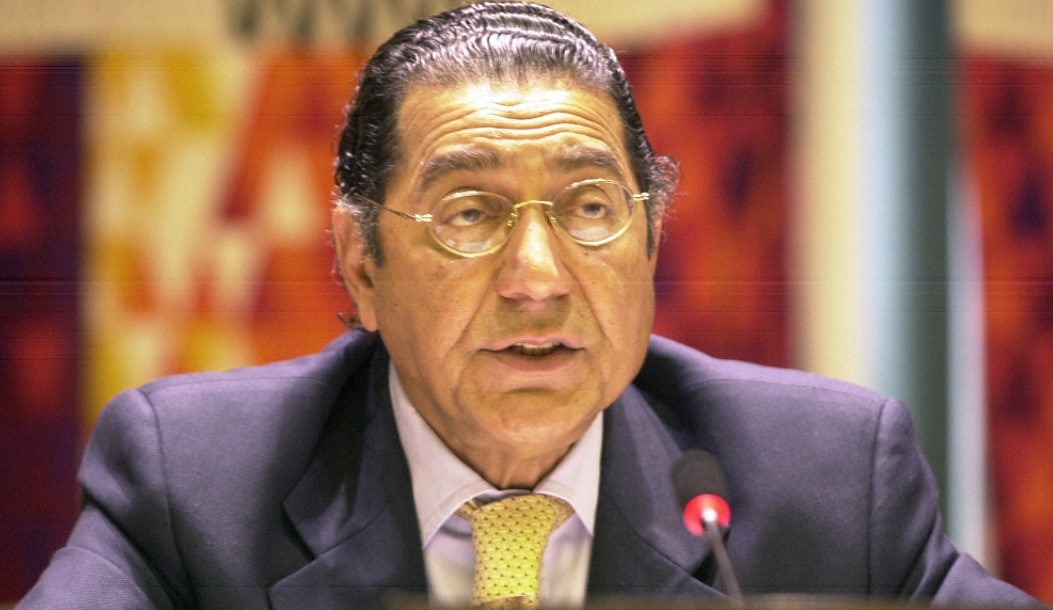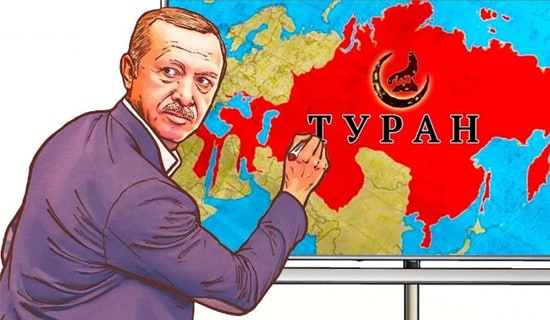
Former Permanent Representative of Pakistan to the United Nations Munir Akram (image courtesy Iisd.org).
In an August 21, 2017 speech, President Donald Trump announced a new U.S. strategy on Afghanistan.[1] He criticized Pakistan for sheltering jihadi terror groups, stating: "Today, 20 U.S.-designated foreign terrorist organizations are active in Afghanistan and Pakistan – the highest concentration in any region anywhere in the world." He added: "Pakistan often gives safe haven to agents of chaos, violence, and terror. The threat is worse because Pakistan and India are two nuclear-armed states whose tense relations threaten to spiral into conflict."
Noting a growing concern that Pakistan's nuclear weapons could fall into the hands of terrorists, he said: "In Afghanistan and Pakistan, America’s interests are clear: We must stop the resurgence of safe havens that enable terrorists to threaten America, and we must prevent nuclear weapons and materials from coming into the hands of terrorists and being used against us, or anywhere in the world."
Trump advocated a U.S. policy change on Pakistan, stating: "The next pillar of our new strategy is to change the approach and how to deal with Pakistan. We can no longer be silent about Pakistan’s safe havens for terrorist organizations, the Taliban, and other groups that pose a threat to the region and beyond." He added: "Pakistan has also sheltered the same organizations that try every single day to kill our people [i.e. U.S. soldiers]. We have been paying Pakistan billions and billions of dollars at the same time they are housing the very terrorists that we are fighting."
Although the U.S. president was harsh – accurately so – about Pakistan's role in sheltering terror groups, he did not threaten Pakistan with any coercive measures. In a recent article, Munir Akram – who served as Pakistan's permanent representative to the United Nations – argued that Pakistan should act like North Korea, failing which it could face U.S. sanctions much like in the case of Iran. Given below are excerpts from Munir Akram's article.[2]
"Pakistan's Ability To Resist Indian Diktat And To Disagree With America's Strategic Design Flows From One Principal Source: Its Nuclear And Missile Capabilities"
"U.S. President Donald Trump spoke harshly about Pakistan; but he has not yet imposed sanctions, as has been the case with Iran, nor threatened to 'totally destroy' it, like North Korea. Pakistani diplomats believe there is room to maintain a working if not a cosy relationship with Washington. That remains to be seen. Islamabad disagrees with the 'new' U.S. strategy concerning Afghanistan.
"It will not fight Afghanistan's war on its soil. It will continue to oppose an expanded Indian role in Afghanistan. It wants a political settlement between Kabul and the Afghan Taliban, rather than continued conflict, and coordinated action to eliminate the militant Islamic State [ISIS] group and Al-Qaeda, as well as the Tehreek-e-Taliban Pakistan [TTP], the Jamaatul Ahrar [part of TTP] and the Balochistan Liberation Army, that operate from safe havens in Afghanistan.
"Even if Pakistan and the U.S. are able to reconcile their divergent positions on Afghanistan, the emerging strategic alignments that will shape policies in Asia are unlikely to change. The U.S. has chosen India as its major strategic partner in Asia to counter the rising power of China. The resulting escalation in the Indian threat to Pakistan's security is either irrelevant for the U.S. or part of its strategic plan to weaken Pakistan's opposition to Indo-U.S. regional domination. The recent visit of the U.S. defence secretary Jim Mattis to India [on September 26-28, 2017] has confirmed and reinforced their strategic alliance and intention to collaborate in Afghanistan.
"Pakistan's ability to resist Indian diktat and to disagree with America's strategic design flows from one principal source: its nuclear and missile capabilities. Without this, Pakistan would have been attacked like Iraq or sanctioned like Iran. On the other hand, North Korea, despite its isolation, has been able to thumb its nose at America because of its demonstrated nuclear and missile prowess."
"An Islamic Nuclear Power [i.e. Pakistan] Was Always Anathema For America And Much Of The Western World"; "[U.S.] Is Actively Assisting India In Enlarging And Modernizing Its Nuclear Arsenal"
"An Islamic nuclear power [i.e. Pakistan] was always anathema for America and much of the Western world. The U.S. worked ceaselessly — even when Pakistan was a close ally — to retard and reverse its nuclear and missile programs. This endeavor has intensified since the emergence of the American alliance with India. Apart from the discriminatory technological and political restrictions it has long imposed against Pakistan's strategic programs, the U.S. now demands that Pakistan unilaterally halt fissile material production and the development and deployment of short- and long-range nuclear-capable missiles. Meanwhile, it is actively assisting India in enlarging and modernising its nuclear arsenal, its missile and anti-ballistic missile capabilities, its air and naval forces, as well as satellite and space capabilities.
"There are credible and not-so-secret reports that the U.S. has formulated plans to seize or destroy Pakistan's nuclear weapons in a crisis. American think tanks have concocted scenarios of Pakistan's nuclear weapons falling into the hands of terrorists or, even more absurdly, of the Pakistan Army turning into an 'extremist' or 'jihadi' force. Indeed, such scary scenarios could be engineered as an excuse to execute the 'seize or destroy' plans.
"Matters are more likely to come to a head in the event of another war between Pakistan and India. Kashmir is an ongoing dispute and a nuclear flashpoint. Every India-Pakistan war game confirms the likelihood of a rapid escalation of a conflict to the nuclear level due to the asymmetry in conventional forces. A war should thus be unthinkable. Yet, India's political and military leaders continue to speak of 'surgical strikes' and a 'limited' war against Pakistan. If India does ever decide to go to war with Pakistan, it would have to first conduct a pre-emptive strike to eliminate Pakistan's nuclear deterrence capabilities. Or, would the U.S. be prepared to do so on India's behalf? Pakistan must be prepared for both contingencies.
"Islamabad must presume that in the course of its past (ill-considered) 'cooperation' with the U.S. to enhance the 'safety and security' of Pakistan's nuclear assets, the U.S. has gained considerable intelligence about Pakistan's strategic assets. However, Pakistani officials correctly discount America's ability to seize Pakistan's nuclear weapons. These are too many, and too widely dispersed and well protected, thus not amenable to any seizure or strike. But nuclear delivery systems are more difficult to hide and protect."
"Pakistan Needs The Acquisition And Deployment Of Early-Warning Capabilities — Satellites, Surveillance Aircraft And Drones; In The Meantime, Pakistan Should Utilise Chinese Early Warning Capabilities"
"In a crisis, it is the delivery systems that will be the prime target of a pre-emptive strike. These are most likely to be detected when, in a crisis, they are being 'mated' with the separately stored warheads. Furthermore, as revealed during the current Korean drama, missile launches can be sabotaged by cyberattacks and other technical means. In the emerging strategic scenario, nuclear deterrence is Pakistan's ultimate assurance against external aggression and coercion.
"Pakistan needs to take several measures so that the credibility of its nuclear deterrence is assured. One, the massive deployment of artillery and short-range missiles (à la North Korea) as the first line of conventional deterrence and defense against an Indian Cold Start [i.e. a doctrine envisaging simultaneous mobilization of India's armed forces] attack. This would deter Indian attack and also raise the nuclear threshold. Two, the multiplication of long-, medium- and short-range nuclear-capable missiles to ensure the penetration of any ballistic missile defense systems that India deploys. Three, the continued production of fissile materials to provide warheads for the enlarged missile force.
"Then, there is the need to 'mate' at least some warheads with delivery vehicles, their dispersal and disguise, or protection in hardened silos, to respond to a pre-emptive strike. Eventually, submarine-launched ballistic missiles could provide an assured second-strike capability. Five, the deployment of effective air defense systems plus a limited number of advanced (and expensive) anti-ballistic missile systems to protect command and control centres. Six, the development of offensive and defensive cyber-warfare capabilities.
"Following this, Pakistan needs the acquisition and deployment of early-warning capabilities — satellites, surveillance aircraft and drones. In the meantime, Pakistan should utilise Chinese early warning capabilities. Lastly, greater integration and inter-operability with Chinese land, air and naval forces to enhance conventional and strategic deterrence, quickly and cheaply. Once Pakistan can demonstrate the complete credibility of its nuclear deterrence posture, its offers to negotiate peace and security in South Asia and to resolve the Kashmir dispute may evoke a more positive response from both India and the U.S. Pakistan will then also be able to pursue its socioeconomic objectives free from the threats of external coercion, intervention and aggression."





